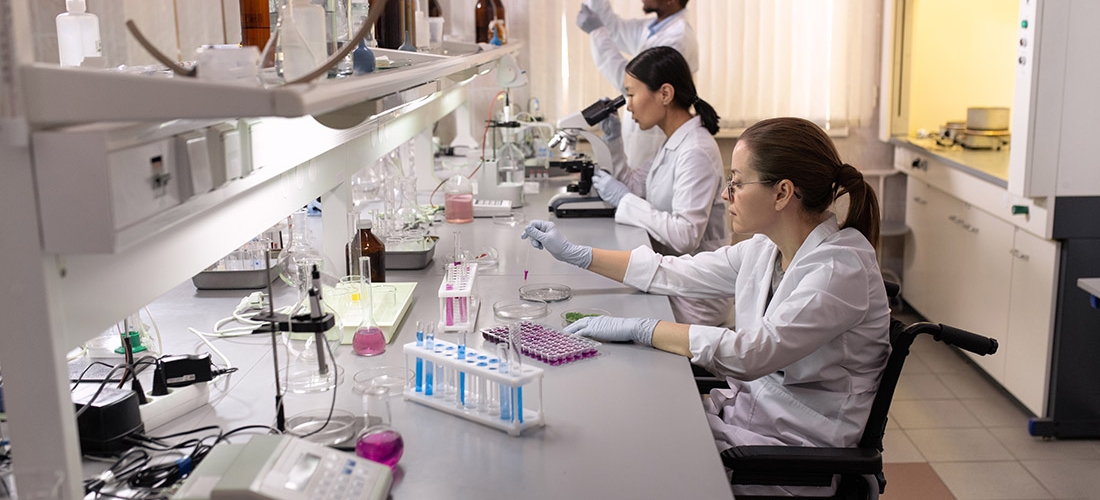Dec 13, 2021 | Diagnostics Activity, News
Scientists Reprogram Resistant Breast Cancer Cells to Sensitive

Scientists may have found a solution to treat an aggressive, treatment-resistant type of breast cancer.
A new study suggests it is possible to change an aggressive type of breast cancer into a non-aggressive type that responds well to common treatments. Scientists discovered a way to sort through the intricate genetic and molecular interactions of two distinct types of breast cancer.
Basal-like breast cancer is the most aggressive type, with a poor prognosis and high mortality rate. It also has a high recurrence rate and chemotherapy is currently the only treatment available. Unfortunately, chemotherapy is not effective and alternative treatments have failed due to the complexity of the disease.
However, luminal A breast cancer tumours are much less aggressive and respond well to drugs such as endocrine therapy. The drug targets a receptor on their cell surfaces called estrogen receptor alpha (ERa).
By studying how both types of cancer behaved, scientists could alter the genes and molecules to make aggressive cancer resemble non-aggressive cancer.
“There have been a tremendous number of studies trying to find therapeutic targets for treating basal-like breast cancer patients. But clinical trials have failed due to the complex and dynamic nature of cancer. To overcome this issue, we looked at breast cancer cells as a complex network system and implemented a systems biological approach to unravel the underlying mechanisms that would allow us to reprogram basal-like into luminal-A breast cancer cells.”
Says Kwang-Hyun Cho, KAIST systems biologist.
Comparing treatment-resistant and treatment-sensitive cancer cells
Kwang-Hyun Cho, KAIST systems biologist, and colleagues analysed large amounts of cancer patient’s data to understand the differences between the genes and molecules in the two types of breast cancer.
Kwang-Hyun Cho and his team compiled this data to form a mathematical model which could simulate how each breast cancer type changed when they turned certain genes on or off.
The team then continued to experiment with real breast cancer cells. They found that two key gene regulators, called BCL11A and HDAC1/2, could reprogram a basal-like breast cancer. If the scientists turn off these two gene regulators, the basal-like cancer cells signalling pathway switches to resemble the pathway used by luminal A cancer cells. By reprogramming the basal-like cancer cells, they become more responsive to the drugs that target the ERa receptors.
More testing will be needed to confirm if this reprogramming solution would successfully treat cancer patients.
“Our study demonstrates that the systems biological approach can be useful for identifying novel therapeutic targets,” says Cho.
Cho and his team are now expanding the mathematical model to include all breast cancer subtypes to identify which cells scientists could reprogram to positively respond to treatment.
Innovative technologies can transform the future of cancer care
This research is fascinating and proves the necessity of funding innovative technologies to help fight and prevent cancer. Hopefully, this research will become a successful treatment against aggressive cancer types.
At RMDM, we are committed to early detection and helping to clear the cancer backlog.
To help enable earlier detection, we are working hard to make our PanTum Detect test available in the UK. We are currently discussing potential partnerships with labs and clinics around the UK.
PanTum Detect can detect all cancers via a simple blood test, making it affordable and accessible for a primary care setting.
If you would like to partner with RMDM or find out more about PanTum Detect, please get in touch via our contact form.
Resources
- https://cancerres.aacrjournals.org/content/early/2021/11/26/0008-5472.CAN-21-0621#
- https://www.news-medical.net/news/20211207/Scientists-find-new-way-to-reverse-aggressive-breast-cancer-into-a-less-dangerous-kind.aspx
- https://www.breastcancer.org/symptoms/types/molecular-subtypes